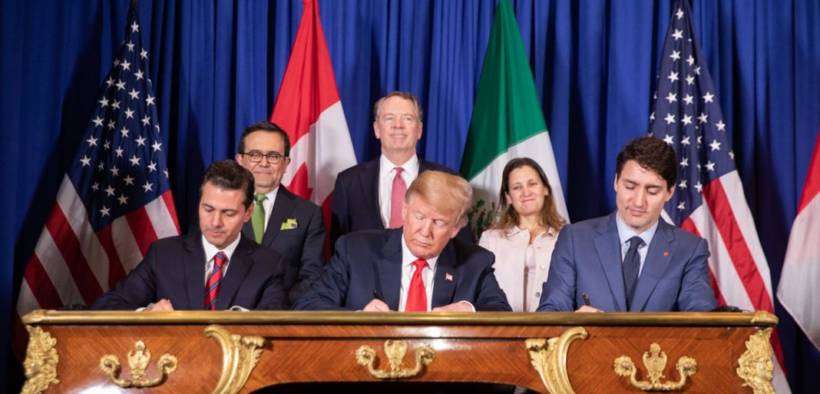New US Trade Deal Slammed For Ignoring Climate Change

“As wildfires rage out of control and our planet endures record-breaking temperatures, Democrats must stop oil and gas companies from using backroom trade deals to destroy the environment.”
The new NAFTA replacement, the U.S.-Mexico-Canada Agreement (USMCA), passed through the Senate 89-10 on Thursday despite failing to mention climate change a single time, leading critics to condemn the deal for incentivizing increased fossil fuel development in continental supply chains at a time when scientists warn of the immediate need to transition to clean energy.
“Historically, trade deals have been huge drivers of climate change. NAFTA, for instance, incentivized the expansion of industries with high carbon footprints, like energy and agriculture, over environmental regulation,” wrote Gizmodo’s Dharna Noor. “U.S. natural gas production, for instance, has soared in the past three decades. That’s due to fracking innovation, but it’s also because NAFTA incentivized gas production.”
The new trade deal allows fossil fuel corporations to challenge new regulations proposed by countries signed onto it and will enable industries to outsource pollution to countries with weaker environmental regulations. As Noor notes, after the U.S. began enforcing restrictions on lead contamination, many companies used NAFTA to relocate to Mexico. The deal also includes a provision that automatically approves natural gas exports to Mexico.
“Trump’s NAFTA 2.0 is a climate failure any way you slice it,” the Sierra Club’s Ben Beachy told Kate Aronoff with the New Republic. “Today’s vote moves us one step closer to locking in Trump’s polluting legacy for decades to come.”
Major environmental groups unanimously condemned the agreement.
“This final deal poses very real threats to our climate and communities and ignores nearly all of the fundamental environmental fixes consistently outlined by the environmental community,” environmental groups including the Sierra Club, Greenpeace and 350.org wrote in a letter, noting that “the deal does not even mention climate change, fails to adequately address toxic pollution, includes weak environmental standards and an even weaker enforcement mechanism, supports fossil fuels, and allows oil and gas corporations to challenge climate and environmental protections.”
“As wildfires rage out of control and our planet endures record-breaking temperatures, Democrats must stop oil and gas companies from using backroom trade deals to destroy the environment,” said Erich Pica of Friends of the Earth U.S.
Several other Democrats opposed the trade deal for its failure to address the climate crisis, including Sens. Kirsten Gillibrand, Kamala Harris, Ed Markey, Sheldon Whitehouse, Jack Reed, Brian Schatz and Bernie Sanders, while 2020 candidates Elizabeth Warren and Amy Klobuchar supported it. 83 percent of Democratic voters believe trade agreements should address climate change, according to recent polling from Data for Progress.
Sanders spoke of climate change as his reason for opposing the trade deal during Tuesday night’s CNN debate, which was widely criticized for its bias against him, but was cut off by a moderator who said climate change would be discussed later.
“But they’re the same,” Sanders responded.
Critics argue a responsible deal would require signatories to adopt binding environmental standards and reduce carbon emissions.
Sen. Gillibrand described the deal as a “missed opportunity to address the urgent threats we face from climate change. It fails to close loopholes for corporate polluters or set binding, enforceable standards to protect clean air and water.”
The Trump administration also signed the first phase of a trade deal with China this week that requires the country to buy at least $52.4 billion’s worth of U.S. energy, including oil and liquefied natural gas. Experts say these deals demonstrate a failure to recognize the connection between trade and the climate crisis, as carbon emissions come not only from domestic production but also from exports and imports.
“Domestic policy, trade policy and climate policy all happen in their own silos and there isn’t a lot of systematic attention being paid to how to bring those conversations together,” Todd Tucker, a political scientist and fellow at the Roosevelt Institute, told the New Republic’s Kate Aronoff.
Jonas Nahm, a political scientist at John Hopkins’s School of Advanced International Studies, told Aronoff that the U.S. should be cooperating with China and other countries to phase fossil fuels out of global supply chains and make use of different countries’ comparative advantages.
“China controls so much of the manufacturing capacity for so many of the technologies we need to combat climate change that—in the timeframe that we have to make a difference—the world cannot replicate this ecosystem elsewhere. It took China 30 years to build the capacity to do this and so now it’s making 60 percent of the world’s solar panels, nearly 70 percent of the batteries, and a third of the wind turbines,” Nahm told Aronoff. “We don’t have any of the basic ingredients that you would need to do the same thing China is doing. To try replicate that elsewhere will just delay us infinitely.”















